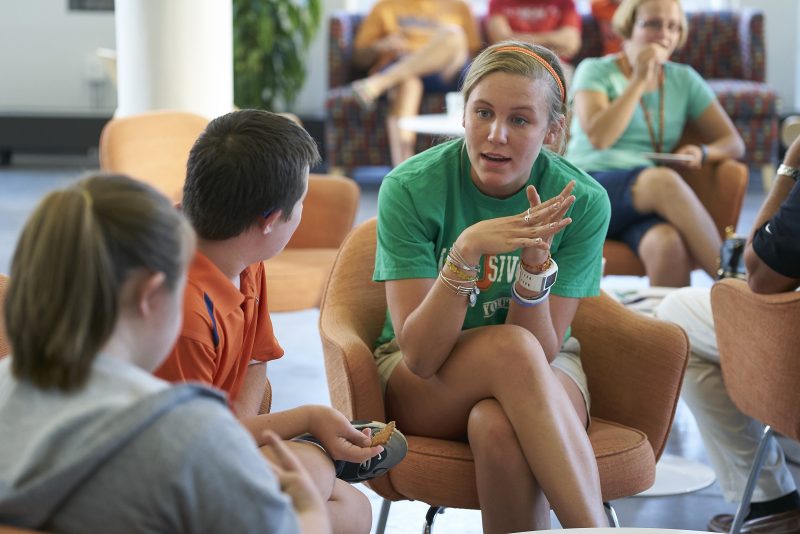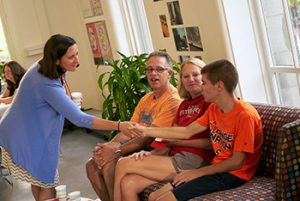 The School of Education at Syracuse University today received a $3 million gift from The Taishoff Family Foundation of Naples, FL to support The Lawrence B. Taishoff Center for Inclusive Higher Education at the University. It is the largest single gift in the School of Education’s history and will support research, make higher education more inclusive to students with intellectual and developmental disabilities, and create pathways to academic and social success.
The School of Education at Syracuse University today received a $3 million gift from The Taishoff Family Foundation of Naples, FL to support The Lawrence B. Taishoff Center for Inclusive Higher Education at the University. It is the largest single gift in the School of Education’s history and will support research, make higher education more inclusive to students with intellectual and developmental disabilities, and create pathways to academic and social success.
The gift will also be used to expand InclusiveU, the Taishoff Center’s signature certificate program. InclusiveU enables students with intellectual and developmental disabilities to become fully included in campus and community life at the University, while achieving their highest potential through post-secondary education. InclusiveU currently supports 12 students on the Syracuse campus, and plans to increase that number to 60 over the next five years.
“For many years, the Taishoff Family has very generously supported the School of Education’s historic leadership in disability studies and inclusion,” says Syracuse University Chancellor Kent Syverud. “Inclusion is an important theme as Syracuse University moves forward in educating students who are prepared to achieve their fullest potential. This gift will help to continue the school’s groundbreaking research, and support important opportunities such as InclusiveU.”
“Nine years ago I had an idea for a center of excellence that would offer a fully integrated educational experience within the University, focusing on the specific needs of members of the community who are largely marginalized after high school,” says Capt. Robert P. Taishoff ’86 USN RETIRED, chairman of the Taishoff Family Foundation and Syracuse University Trustee. “One of the main criteria of this educational experience is that it should lead to employment just like post secondary education does for typical students. Many individuals with intellectual disabilities have untapped talents that will ultimately contribute to society. This is not easy work as an institution, but I am confident that under Chancellor Syverud’s leadership we are going to fulfill the vision my father and I hoped for so many years ago!”
The Taishoff Center is dedicated to providing full and equitable participation of students with disabilities in higher education, especially students who have traditionally been excluded from post-secondary education. The Center was established in 2009 by the Taishoff Family and has been operating InclusiveU at Syracuse University since 2013. Since its inception, the Taishoff Center has made significant impact in supporting students with disabilities in higher education and within society at large. The Center has hosted two national conferences and its staff have secured more than $1.2M in grants from the Fund for the Improvement of Postsecondary Education (FIPSE) and National Institute on Disability and Rehabilitation Research (NIDRR), and presented at conferences nationwide.
The expansion of the Taishoff Center and the development of InclusiveU is another milestone in Syracuse University’s long history of leadership in disability studies and inclusion. The first Disability Studies program in the country and the first Disability Cultural Center of its kind for students on campus were both created at Syracuse; and the School of Education is also home to research and training centers like the Institute on Communication and Inclusion and the Center on Human Policy.
 Beth A. Myers, interim director of the Taishoff Center and research assistant professor at the School of Education, says the $3 million gift will strengthen the work of the Taishoff Center and InclusiveU, and she hopes that the University will become a global destination for students with intellectual and developmental disabilities.
Beth A. Myers, interim director of the Taishoff Center and research assistant professor at the School of Education, says the $3 million gift will strengthen the work of the Taishoff Center and InclusiveU, and she hopes that the University will become a global destination for students with intellectual and developmental disabilities.
“At Syracuse, students with disabilities can participate in university classes based on their interests, complete individualized coursework, professional internships, and participate in student activities,” says Myers. “The five year plan for the Center includes on-campus living options that will prepare them for employment and self-direction.”
Individuals who are age 18 or older with intellectual and developmental disabilities — including labels such as autism spectrum disorder, Down syndrome, traumatic brain injury, and cerebral palsy —have traditionally been excluded from full and equitable participation in postsecondary education and, after age 21, experience unemployment at rates of up to 80 percent. Nationwide, the number of students with disabilities who may be eligible for postsecondary education is near 3 million, and only 86 four-year universities welcome students with intellectual disabilities. Of those 86, fewer than 15 offer a fully inclusive learning experience.
Myers says that in addition to offering a top-notch experience here at Syracuse, another goal is for InclusiveU to be viewed as a national model of best practice in post-secondary education for students with significant disabilities. “The intention is not for Syracuse University to become the only place for students with intellectual and developmental disabilities, but rather to support the growth of capacity within all institutes of higher education so students can attend the college or university of their choice.”
Press contact: Jennifer Russo | 315-443-4698 | jhrusso@syr.edu | news.syr.edu
